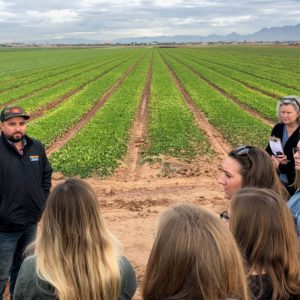By: Paige Mollen, ASU Food Policy and Sustainability Leadership Certificate student.
Just off the 101 Freeway on the outskirts of sunny Scottsdale, Arizona sits TLC Vegetable Farm, an organic baby greens operation housed in the heart of the Salt River-Pima Maricopa Indian Community. On a chilly, overcast morning in December 2019, The ASU Food Policy and Sustainability Leadership cohort visited TLC Vegetable Farms in Scottsdale, Arizona. This farm of beautiful greens spans as far as the eye can see. It serves as a satellite organic baby greens operation for a larger conventional leafy greens’ farm in Yuma, Arizona - the winter lettuce capital of America! In fact, nearly 90 percent of all leafy vegetables grown in the United States hail from Yuma.
TLC Vegetable Farm is relatively new to the organic baby greens industry. They are meeting the demand of consumers interested in organics. The greens were recently harvested the day of our visit with new growth set to be tilled into the soil. TLC Vegetable Farm grows exclusively for Dole and they “don’t put seeds into the ground unless under contract.” They produce, harvest and share refrigeration with neighboring farms until the trucks arrive to transport the produce to the next phase of packaging and distribution. Organic baby greens are exclusively harvested by machine technology. The lettuce produced in Arizona leaves the state to other locations of the country. This is in stark contrast to the local organic farm visited by our cohort earlier in the week. This farm grows a variety of crops and produces value added items for sale at farmer’s markets and an onsite store to survive economically. They harvest by hand and their products stay in Arizona for locals to enjoy.
The primary topic of our tour was centered around food safety guidelines. TLC Vegetable Farm puts a strong emphasis on their food safety management plan. They follow standards outlined in the Food Safety Modernization Act with certifications under the Arizona LGMA. TLC Vegetable Farm adheres to USDA organic compliance audits with both scheduled and unannounced visits.
The Sonoran Desert is home to a host of wildlife, with coyotes being the greatest threat to TLC Vegetable Farm’s food safety. The fields are regularly monitored and quarantined, or fenced off if contamination is suspected. Any potentially contaminated produce is discarded. Proper refrigeration and storage are also high priority to ensure consumer safety.
The opportunity to visit TLC Vegetable Farm and compare it to other local organic operations offered a comprehensive perspective of different business models in the greater Phoenix area. I encourage others to visit a variety of different operations to listen, observe, learn and reflect on the unique opportunities and challenges of organic farming. Learning is an exciting adventure…enjoy the journey!
